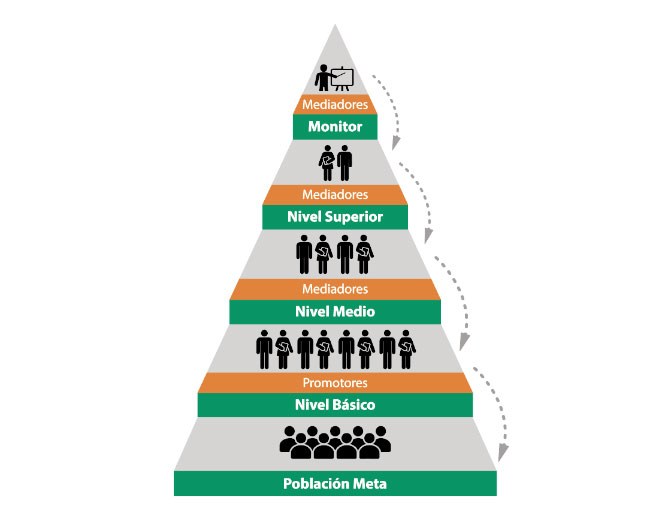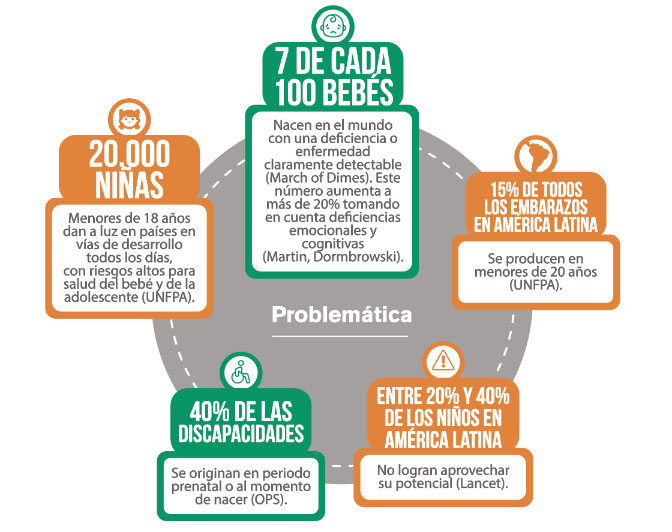PRENATAL PROGRAM
PreNatal contributes to generating responsible and healthy changes in the behavior and conduct of women, the family and the community to prevent diseases and deficiencies that may cause some type of disability in unborn children and during early childhood.
out of 100
Babies are born in the world with a clearly detectable deficiency or disease at birth.
Source: March of Dimes
%
This number increases to more than 20% taking into account emotional and cognitive deficiencies that show up later in life.
Source: Martin, Dormbrowski
40% of disabilities originate from prenatal or at birth (PAHO).
In Latin America, the leading cause of morbid mortality in children under 5 years of age is prematurity (WHO).
20.000
Every day 20,000 children under the age of 18 give birth in developing countries, with high risks to baby and adolescent health (UNFPA).
BIRTHS PER 1000 WOMEN
%
Persistent social inequality in our region requires intervention in the most disadvantaged geographical regions.
OUR STRATEGIES
Prevention training for mediators/change agents, with quality and the use of state-of-the-art technology.
Sensitization of men, women and adolescents to generate responsible and healthy changes.
Positioning of the prevention of diseases and deficiencies through articulation and advocacy.
Implementation of programs and projects with institutions and/or in ‘remote’ areas, with comprehensive interventions.
Establishment of public-private alliances based on common interests with allies and counterparts.
Knowledge Management and Innovation.
Reach
TYPE OF INTERVENTION
We promote prenatal and postnatal prevention aimed at the United Nations Sustainable Development Goals, as well as the priorities of our local contexts and partners. Interventions can be timely or in the form of projects with partners over several years that include diagnostic, implementation, monitoring and evaluation phases.
They can also incorporate one or more elements, including: actions positioning the theme of prevention, training of mediators and promoters and work with the target population (home visits, workshops, health fairs, dramatizations, among others) to achieve concrete changes in the target population.
<p>Implementation in project format: I work in partnership with public or private institutions to address one or more prevention topics.</p>
<p>Formation of self-formed groups: Professionals who independently decide to take our program and take advantage of grants from the Waal Foundation.</p>
Training
The PreNatal program offers training of mediators and promoters at three levels Higher / Diploma (postgraduate), Medium (undergraduate) and Basic (basic instruction). It is aimed at generating the knowledge, competencies and skills necessary to intervene as an agent of change in prenatal and postnatal prevention of diseases and deficiencies that can cause disabilities.
PreNatal is based primarily on two theoretical currents:



EXPECTED RESULTS
- PIncrease in planned pregnancies.
- PIncreased preconception, prenatal and postnatal care and care.
- PImproved nutrition before and during pregnancy.
- PIncreased awareness of sexual and reproductive rights and obligations.
- PReduction of toxic, physical and emotional risks.
- PStronger and loving relationship between father, mother and baby.
- PProfessional and community leaders with knowledge of mediation strategies, popular education and behavioral changes.
FORMATIVE OFFER
UPPER LEVEL
The Higher Course aims to generate changes in the knowledge and behaviors of mediators so that they become agents of change and promoters of a culture of prenatal prevention of deficiencies and disabilities. Development of a PIP project with logical framework methodology. Semi-presence mode with support of a virtual classroom.
Recipients
Professionals with a university degree in the health, education and development sectors who have an interest in pose sustained work in prenatal and postnatal prevention. This process seeks the training of Mediators to facilitate changes in attitudes, knowledge and practices to promote a culture of prenatal and postnatal prevention. Applicants should have basic knowledge of office and Use of the Internet, have time to dedicate to the course and demonstrate a social commitment to prenatal and postnatal prevention of diseases and deficiencies in unborn children.
MEDIUM LEVEL:
This training process in Prenatal and Postnatal Prevention of diseases and deficiencies that can cause disabilities or prevent full development includes semi-in-person activities and actions in service, aimed at professionals, technicians and promoters in the health, education and community development sectors, public or private institutions. This process seeks the training of Mediators to facilitate changes in attitudes, knowledge and practices to promote a culture of prenatal and postnatal prevention.
Recipients
BASIC LEVEL:
The Basic Course prepares community and health workers, nursing assistants, youth and neighborhood leaders, students, community leaders and anyone interested in bringing about positive changes in society to prevent disabilities and empower capabilities in your community. The promoters trained in the Basic Course maintain a permanent commitment to their role as social educators and to the prenatal disability prevention network maintained by the Waal Foundation in the region.
Recipients
The applicant for the Basic Course must meet the following conditions:
- Show involvement or work in the health, education and / or community development sectors.
- Demonstrate commitment to seeking the well-being of the community.
- Assume yourself as a social educator who acts as an agent of change and transformation.
- Show aptitude and attitude for lifelong learning.
- Co-responsibility with human development.
- Availability of time to complete all the activities of the course.
